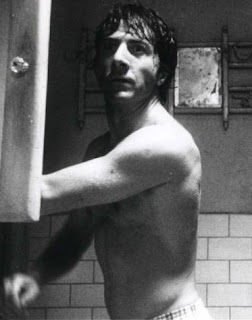Gay subtexts usually require longing looks, physical contact, or at least a same-sex friendship, but in
The Graduate (1967), there is none. The plot centers on Benjamin Braddock (Dustin Hoffman), a recent college graduate, and we do see a lot of him: he is naked more often than clothed, and his hard-muscled physique would not look out of place on a
Chippendales calendar. But there is no one to notice.
Benjamin lives in a world of suburban castles with wide lawns and pools, organization-man husbands, and drunk wives, the logical culmination of the heterosexist myth, a glimpse into his future, a glimpse into the future we were all told that we should long for.
He spends most of the movie trapped, staring mutely from behind fish tanks, wet-suit visors, wide shots angled to suggest enclosed space, and Mrs. Robinson's legs shaped into a triangular dragnet. There is no escape from his Stepford world, not even among the hippies. When he goes to Berkeley, he finds no shaggy-haired, tie-died counterculture, just straights with textbooks. Roger Ebert says that he is "utterly unaware of his generation."
He is a rebel without a cause, made vaguely nauseous by materialism and loveless marriages -- and by his heterosexual destiny. He has no interest in girls until he is seduced by Mrs. Robinson. There are no pictures of girls on his bedroom wall; he mentions no girls at school. It seems unlikely that a handsome track team champ with a magnificent physique would be deprived of hetero-romance, if he desired it, so one must conclude that he doesn't.
The adults seem to notice, and obsessively try to prod him into heterosexual practice, always suggesting that he "call a girl." When Mrs. Robinson first approaches him, he rushes horrified down the stairs, where Mr. Robinson sits him down and has a heart-to-heart: "You should be having fun with girls!" Benjamin protests that he is not interested in girls.
Later Mrs. Robinson tries again. When displaying her body doesn't work, she tries to insult him into bed, accusing him of being a "virgin" and "inadequate," not man enough, that is, gay. Now he "wants" to be a lady-killer; he slams the door and comes toward her. They begin an affair.
Eventually Ben finds a girl, actually the only adult his own age in the entire suburb, Elaine, spontaneous and free, the polar opposite of the cold, calculating, constrained adults. No matter that she is the daughter of his fling Mrs. Robinson, or planning to marry a Stepford beau in a cold, square church in the suburbs. Ben calls her name over and over until she acquieses. "It's too late!" Mrs. Robinson snarls. "Not for me!" Elaine responds.
She and Ben will not forget that they majored in art or married for love. They will be deliriously happy and gloriously fulfilled. They fight off oldsters who are literally snarling with rage, flee the church, and jump on a bus. Fade out to freedom. They have escaped the suburban nuclear family, husband, wife, kids, organization-man job, and house made of ticky-tacky -- the entire heterosexual trajectory -- through heterosexual love.
Then something remarkable happens. Instead of congratulating each other on having discovered the meaning of life, Benjamin and Elaine sit somberly, staring out into space, exactly the way Benjamin looked in the first scene when his airplane began its descent into suburban doom. Paul Simon reprises the theme: "Through restless streets I walk alone." Why is Benjamin still restless, still alone?
Because the bus is taking them right back to the suburbs, where they'll buy a house, and Benjamin will sell plastics, and Elaine will sign up for charity drives, and in twenty years he'll be a workaholic, and she'll be an alcoholic. "The one" inevitably becomes Mrs. Robinson. Heterosexual love provides no escape. They are trapped.
See also:
The Graduate Revisited









